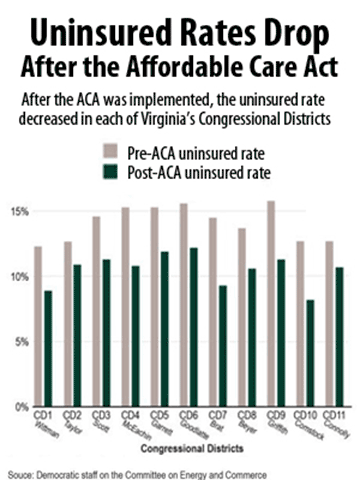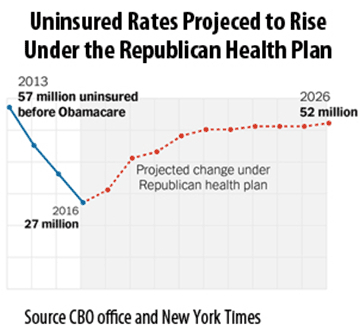State Legislating In The Shadow Of A Trump Presidency
In the weeks that followed the election of Donald J. Trump, a number of state legislators around the country wondered aloud whether the new president was perhaps so enigmatic and unpredictable that he actually would not do what he promised to do during the course of the fall campaign. And others hoped that he might actually follow through on his promise that “all citizens will have really good health care.” They were dramatically wrong on all counts. Trump has done exactly what he promised to do – with startling speed, audacious assertiveness, and with little apparent concern about the real impacts, not only of his tweets, but, more importantly, his policies. This presents significant peril for our constituents, but also unprecedented political opportunities for the upcoming elections. The first test electorally will be November 2017, and Virginia will be at the center of it all. All statewide offices are up for election, as well as 100 seats in the Virginia House of Delegates.
This Fall’s Campaigns
How we run campaigns in the context of the Trump presidency will have lasting implications for the Commonwealth, not just for the next several years, but for at least a decade. This is largely due to the fact that Virginia will experience redistricting at least once, and perhaps twice, during the term of the next Governor. In Bethune-Hill v. Virginia State Board of Elections, the United States Supreme Court, in a 7-1 vote, held that the lower court failed to properly examine Virginia’s 2011 redistricting for possible unconstitutionality. Many of us believe that the court will have no choice but to find that the 11 challenged districts were drawn unconstitutionally, thereby forcing a redistricting as early as 2018. If a Democrat does not hold the governorship at that time, Republicans could potentially control the House, Senate, and executive, thereby giving them substantial control over what new district lines would look like. And then, they could do it again in 2021. This would likely lock in Republican control of the House of Delegates for the next decade.
The fall campaigns will need to determine how to position themselves to respond to the Trump presidency. Many of us were shocked to learn that the president’s crassness, insensitivity, and tweet storms were not, in and of themselves, enough to swing the election. While many of us remain increasingly concerned about his fitness for office, and recognize that many of our supporters are energized by this same concern, that will not be enough to win by itself. Instead, we should remain laser-focused on the policy implications of what is happening in Washington, D.C., and its impact on Virginia.
Trump’s Impact on Virginia
Our state is in a unique position. Under Gov. McAuliffe and the Democrats, the Virginia economy has continued to improve. Since Gov. McAuliffe took office, unemployment has fallen from over 5 percent to 4 percent. Job growth has been impressive, with more than 185,000 jobs created during McAuliffe’s term, with many of them paying more than the prevailing wage in their communities. Almost $15 billion in capital investment has been brought to the state through business expansions or recruitment of new businesses. Trump’s policies have the potential to undo much of that. Consider the following:
- In Trump’s first month, he imposed a hiring freeze on federal employment. Since Virginia is more federally dependent than almost any other state in the country, a hiring freeze has dramatic implications for job creation, primarily in Hampton Roads and Northern Virginia. It further has the effect of depressing wages during a time when wage growth has just begun to recover from the aftermath of sequestration.

 While repeal and replacement of the Affordable Care Act is by no means a “done deal,” Trump’s full-throated endorsement of Paul Ryan’s draconian plan, and his backtracking on his political promises that everyone will have healthcare, will dramatically affect views of Virginians about their economic security. Under the initial repeal proposals, up to 400,000 Virginians could lose their health insurance (see the image at right showing improved uninsurance rates for every Virginia House District after the ACA was implemented), and the nonpartisan Congressional Budget Office (CBO) has just projected that repeal will mean 24 million Americans will lose their insurance by the year 2026. Under repeal, support for Planned Parenthood initiatives would be undermined, thousands of Virginians losing access to care. And even state Republican leadership is very concerned about the proposed “block granting” of Medicaid funding and the imposition of a cap on what the federal government will pay states. Since the block grant amount is determined based on historical spending in a state, Virginia’s historic stinginess in its Medicaid spending – as well as our failure to expand the program – will mean fewer dollars to those citizens in need and larger stresses on both our state budget and our hospitals throughout the state, which will be forced to take more persons with serious healthcare needs into their emergency rooms. Insurance premiums are projected to rise, and benefits are likely to fall. Republicans will no longer be able to duck this issue by blaming the alleged failures of the ACA. This is now their issue, and it is not clear that they have either the desire or the skill to fix it. The impact of repeal will be strongly felt in Virginia as it will throughout the rest of the country, and it is an essential piece of the argument that citizens are less economically secure under Trump.
While repeal and replacement of the Affordable Care Act is by no means a “done deal,” Trump’s full-throated endorsement of Paul Ryan’s draconian plan, and his backtracking on his political promises that everyone will have healthcare, will dramatically affect views of Virginians about their economic security. Under the initial repeal proposals, up to 400,000 Virginians could lose their health insurance (see the image at right showing improved uninsurance rates for every Virginia House District after the ACA was implemented), and the nonpartisan Congressional Budget Office (CBO) has just projected that repeal will mean 24 million Americans will lose their insurance by the year 2026. Under repeal, support for Planned Parenthood initiatives would be undermined, thousands of Virginians losing access to care. And even state Republican leadership is very concerned about the proposed “block granting” of Medicaid funding and the imposition of a cap on what the federal government will pay states. Since the block grant amount is determined based on historical spending in a state, Virginia’s historic stinginess in its Medicaid spending – as well as our failure to expand the program – will mean fewer dollars to those citizens in need and larger stresses on both our state budget and our hospitals throughout the state, which will be forced to take more persons with serious healthcare needs into their emergency rooms. Insurance premiums are projected to rise, and benefits are likely to fall. Republicans will no longer be able to duck this issue by blaming the alleged failures of the ACA. This is now their issue, and it is not clear that they have either the desire or the skill to fix it. The impact of repeal will be strongly felt in Virginia as it will throughout the rest of the country, and it is an essential piece of the argument that citizens are less economically secure under Trump.- Finally, the continuing immigration dispute will resonate throughout Virginia, primarily in communities with large immigrant or refugee populations, such as Northern Virginia and the Shenandoah Valley. In January, I asked my colleagues in the General Assembly to join in a letter to Trump expressing concerns about his executive order banning immigration from certain Muslim-majority countries; not one Republican signed it, as you can see below. Some people find it hard to believe how scared many of our communities feel because of Trump’s executive orders and his divisive comments about immigration. But there is no escaping it; Virginia residents are justifiably concerned that their families and those of their relatives will be split apart by these restrictions, thereby exacerbating economic and social insecurity.
Republican Silence
My Republican colleagues were strangely silent during the last legislative session when confronted with these developments. In January, I also asked all of my House colleagues to sign a letter expressing concerns about the repeal of the ACA and its implications for Virginia. No Republican signed. You can see the ACA letter below. When I spoke on the House floor about the serious economic concerns prompted by Trump’s hiring freeze in one of his very first executive orders, no Republican said a thing.
Virginia Republicans are now stuck with Trump, and few seem to be willing to move away from him, no matter how outrageous his behavior or policy initiatives continue to be. In contrast, Democrats in Virginia are united in growing the economy and protecting the rights of citizens.
The extent to which Trump will have an impact on the ballot box in November is presently hard to assess. Both Democratic candidates for Governor have emphasized their opposition to Trump, and House Democrats see unprecedented opportunities in the fact that Hillary Clinton carried 17 House districts that Republicans currently represent in the General Assembly. A lot of work is ahead, but there is no doubt that the pot has been stirred, the energy unleashed, and Virginia is poised to make a statement this November about the direction of this Commonwealth and our country.
I hope you’ll join me and Senator Creigh Deeds at our Town Hall meeting on Tuesday, March 28, from 6:00 to 8:00 pm at Monticello High School, to talk about the recent General Assembly session and the state of our state government.
